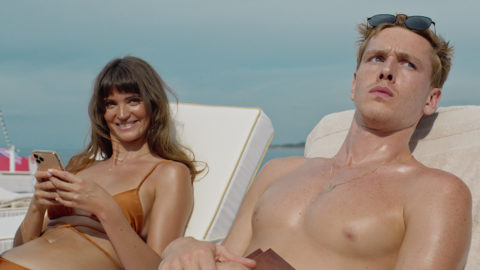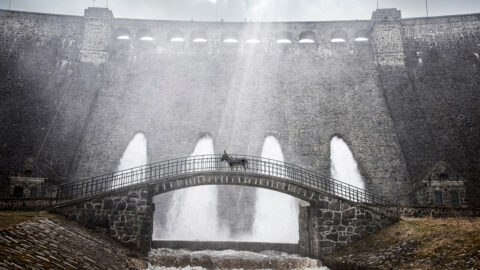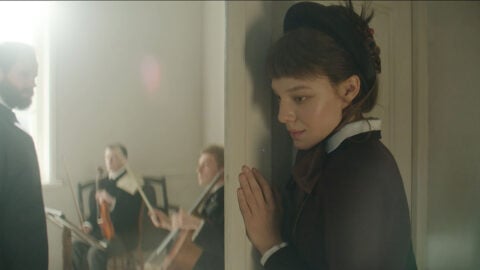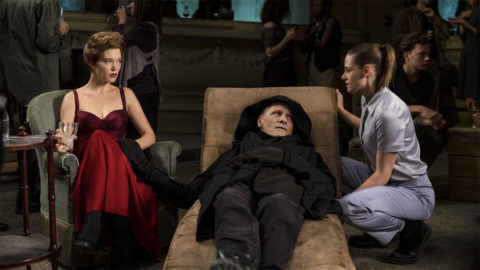Cannes 2022: Your Show of Shows
This article appeared in the May 20, 2022, Cannes Film Festival special edition of The Film Comment Letter, our free weekly newsletter featuring original film criticism and writing. Sign up for the Letter here. Catch up on all of our coverage of the 2022 Cannes Film Festival here.
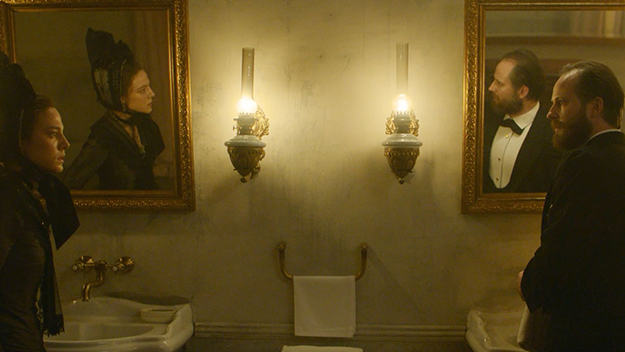
Tchaikovsky’s Wife (Kirill Serebrennikov, 2022)
When the Cannes Film Festival organizers decided to make the iconic image of its 75th edition an homage to Peter Weir’s The Truman Show—the official festival poster shows the moment when Jim Carrey touches the fake horizon of Truman’s virtual world—they likely didn’t foresee that the image might imply something other than a “poetic celebration of the insuperable quest for expression and freedom” (as the Cannes press office has it). Isn’t it also possible to read the Cannes-Truman poster as a representation of a shimmering reality revealing the artificiality of its own facade? This sense of a self-styled celestial kingdom—often called “the greatest film festival in the world”—exposing its limitations was on the minds of many attendees during the chaotic three days of ticketing reservation leading up to opening night. Thankfully, as the ceremony commenced one day after the total collapse of the online ticketing system, members of the press were offered access to an alternative and perfectly effective ticket office. Other attendees simply had to get used to the tortuous daily routine of accessing the system, a situation the festival has blamed on “acts aimed at saturating the site with ticket requests.” It’s reached the point where a film-programmer friend showed me a meme of a T-shirt with the Cannes logo and a “504 Gateway Time-out” message.
The idea of revealing the dark reality of the institutions behind popular myths has also been the driving force in some of the films shown during the first three days of Cannes. Russian filmmaker Kirill Serebrennikov opened the Official Competition with his elegant and scathing period film Tchaikovsky’s Wife, a study of the relationship between the Swan Lake composer and his wife Antonina Miliukova. Less hermetic than Petrov’s Flu, Serebrennikov’s entry in last year’s Competition, Tchaikovsky’s Wife uses the story of a dysfunctional marriage, broken by the composer’s hidden homosexuality and despair, to create an allegory of a nation corrupted by hypocrisy and mercilessness. Elsewhere, Italian maestro Marco Bellocchio, as blunt as the Russian dissident, made it worth this critic’s while to spend five hours watching the brilliant six-episode series Exterior Night, which revisits the kidnapping and murder of the politician Aldo Moro, two-time Prime Minister of Italy, in the spring of 1978. After detailing the infamous magnicide in his 2003 feature Good Morning, Night, Bellocchio expands on the story here, weaving a rich social tapestry inhabited by soulless politicians, alienated terrorists, helpless families, and a tormented pope, brilliantly played by Toni Servillo. Essentially an elegy for a good man, Exterior Night adopts an empathic approach to the suffering of its characters, and flies highest when Bellocchio plays with symbolism—the Pope imagining the Stations of the Cross with Moro in place of Christ—and with Brechtian detachment, as when the central execution is staged by a university theater troupe.
Moro’s wife, Eleonora Chiavarelli (played by the great Margherita Buy), is among the most memorable of this year’s numerous empowered female characters. In Pietro Marcello’s Scarlet—the Italian filmmaker’s fiction follow-up to his 2019 breakout Martin Eden—newcomer Juliette Jouan plays a young girl, also called Juliette, confronting several forms of social violence in post–World War I France: male aggression, the birth of a consumerist society, and most strangely, rumors of her being a witch. In this fable-like adaptation of Alexander Grin’s Russian adventure novel Scarlet Sails, the young Juliette builds her own Garden of Eden with her widowed father (Staying Vertical’s Raphaël Thiéry), far from the dangers of modernity, evoked by images taken from Julien Duvivier’s Ladies’ Paradise (1930). Unlike the somber, pessimistic Martin Eden, with its spectacular blurring of time periods, the inspiring and linear Scarlet recalls the romantic, against-all-odds triumph of the marginal heroes of Marcello’s 2009 hybrid The Mouth of the Wolf.
Scarlet opened the Directors’ Fortnight section, where it found good company in Elena López Riera’s The Water. In this remarkable first feature, the Spanish filmmaker blends romantic drama, ethnography, and folkloric magic to portray three generations of a “cursed” family, all passionate single women who are said to live under the influence of “the water.” López Riera punctuates this fairy-tale fiction with documentary scenes of older women relating a local myth about a bride who is seduced and abducted by a river, a story that underlines a culture of simultaneous fetishization and punishment of female desire. Also in Directors’ Fortnight, Saela Davis and Anna Rose Holmer’s God’s Creatures is another study of patriarchal violence, this time set in a small fishing town in Ireland. The film is a slow-burning psychodrama in which a close mother-son relationship is challenged when the young man is accused of sexual assault. The filmmakers overestimate the expressive benefits of packing their shots and dialogue with references to Christianity, but the sight of Emily Watson “breaking again the waves”—figuratively and literally here—makes God’s Creatures a pleasurable and worthwhile experience.
With the Official Competition just warming up, the unquestionable highlight to date was an unforgettable Cannes Classics screening of a new pristine 4K restoration of The Mother and the Whore, Jean Eustache’s monumental 1973 elegy to the shattered dreams of the generation of May ’68. I am convinced that there won’t be a more beautiful and emotionally crushing film in this year’s edition. On day two of the festival—as Tom Cruise walked the Top Gun: Maverick red carpet and a squad of fighter jets streaked the sky the colors of the French flag—nothing could compare to the symbolic and artistic grandeur of The Mother and the Whore stars Jean-Pierre Léaud and Françoise Lebrun, both now 77, receiving a heartfelt post-screening ovation. Though the glamour of the festival can be blinding, great cinema regularly comes to the rescue, reminding us once again of the limits of spectacle.
Manu Yáñez Murillo is a Barcelona-based film critic and scholar who has been a contributor to Film Comment since 2006. He is the editor-in-chief of the website Otros Cines Europa and the editor of the anthology La mirada americana: 50 años de Film Comment.



